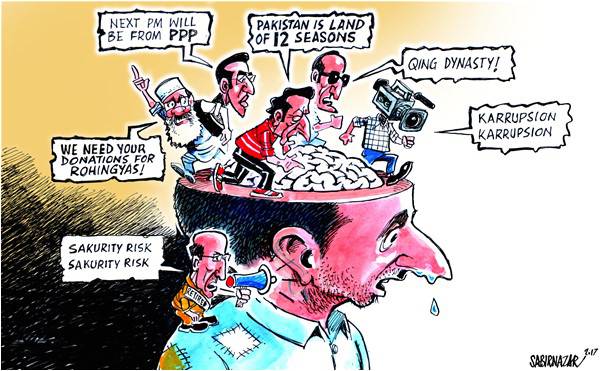
Iraq an Iranian colony
Sir,
The recent takeover of Kirkuk by the Iranian-backed militias and Iraqi army clearly illustrates that now Iran is calling the shots in every important decision of Iraq. This whole operation and withdrawal of the PUK peshmerga without putting up a resistance to advancing Iraqi forces was planned by the Iran Quds force commander Major General Qassem Soleimani. The extent of the involvement of the Iraq Prime Minister’s office in this whole episode is still unclear but one thing is certain: decisions were made in Tehran and Baghdad only followed them.
Geopolitical observers are now criticizing Iraqi Prime Minister Haider al-Abadi for being too quick to resort to force against the Kurds at the behest of Iran rather than engage in talks with Erbil which helped Baghdad in the fight against ISIS.
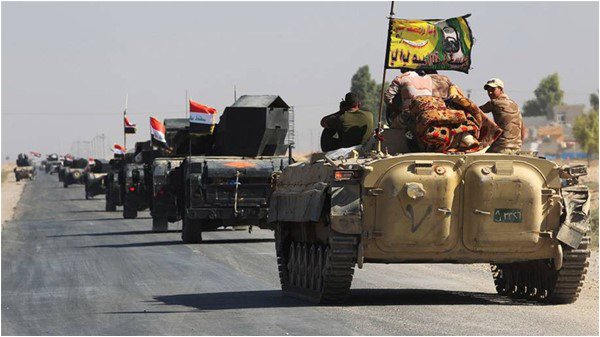
There are number of ways in which Iran gains from this current crisis. Not only does the conflict undermine Kurdish unity, it also boosts the role of Iranian-backed Shia militias like Hashd al-Shaabi in Iraq and makes them look like guardians of national unity rather than proponents of sectarianism. But as a nation Iraq is at loss as it has sparked anger against the federal government among its sizeable Kurdish minority.
The fall of Kirkuk clearly showcases the extent to which Iraq today is an Iranian-controlled territory. And it demonstrates the unparalleled efficacy of the Iranian methods of revolutionary and political warfare, as used by the Iran Revolutionary Guards Corps (IRGC) throughout the Arab world to promote Iran geopolitical interests. Iran’s influence in Iraq is not just ascendant, but diverse, extending to almost every walk of life. Let’s have a look at various areas where Iran is dominating the Iraqi arena.
Politics: During Saddam Hussein’s rule, Iran granted asylum to a number of Iraqi opposition parties and part of its ability to greatly affect the Iraqi political theatre today is linked to the fact that the individuals comprising a signi?cant portion of the Iraqi political map formerly resided in Iran. Politically, Iran has a large number of allies in Iraq’s Parliament who can help secure its goals. Even the most senior Iraqi cabinet officials take instructions from Iran’s leadership.
Military: Tehran has been the principal backer of the mainly Shiite Popular Mobilisation Forces (PMF) formed to fight the Islamic State and now formally absorbed into the Iraqi military. The Iranian Revolutionary Guards Corps overseas arm, the Quds Force, provides the bulk of logistical support and advice to Popular Mobilisation Forces. In turn then Iran uses the PMF to exert military leverage over the Iraqi government to wrestle power on behalf of Iran, much like Hezbollah did in Lebanon.
Economy: Trade between these two nations is primarily unidirectional in favour of Iran and years of sanctions and internal conflicts have rendered Iraq dependent on Iranian imports. The only place outside Iran where the Iranian currency the “Rial” is used as a medium of exchange is southern Iraq. Iran is dumping cheap, subsidized food products and consumer goods into Iraqi markets and is undercutting its neighbour’s agricultural and manufacturing sectors.
Natural resources: Iran’s damming and diversion of the rivers feeding the Shatt al-Arab waterway has greatly undermine the Iraqi agriculture sector in the south and hindered efforts to revive Iraq’s marshlands. Iran has withheld water flows of the Kalal River, which flows into Wasit province, and of the Karun and Karkha rivers, which flow into Basra province.
Religion: Iran has been pursuing a long-term strategy to expand its religious authority in Iraq in many ways. Like by using financial and political leverages to ensure the primacy of clerics trained in the Iranian seminary of Qom and loyal to the Iranian ideology, over clerics trained in the relatively non-political tradition of the Najaf seminary. Then by reconstructing the Shia shrines in Iraq and consequently, taking control of their management in the long run. And lastly, by taking control of the pilgrimage observances in Iraq’s shrine cities, notably the Arbaeen procession which attracts millions of devotees every year in Karbala.
Despite this great degree of Iranian influence on the Iraqi nation still there is a ray of hope. Current Prime Minister Haider al-Abadi has the potential to be pulled out of Iran’s influence and act as an independent figure. This is especially true as he has stood in the face of Iran’s pressures on some occasions. But still al-Abadi government officials must prove their allegiance to the Iraqi people and not to the Iranian regime. The Iraqi judiciary is also heavily under Tehran’s influence, seen specifically when the country’s supreme court last October blocked al-Abadi’s reform package. Efforts have to be made to cleanse the judiciary and make it independent. Current Iraqi leadership should also try hard to bridge the gulf with its Sunni and Kurdish minorities by establishing an equal method of governance across the country. Not all Iraqi Shias are pro-Iranian puppets in fact, many are fervidly nationalistic. Prime Minister Abadi can tap into Iraqi nationalism to combat further sectarian division.
Manish Rai,
Via email.
One-wheeling stunts
Sir,
One-wheeling has become the rage in cities such as Lahore, Karachi, Islamabad, Rawalpindi and is spreading to small cities and even villages.
Any special day (Independence Day, Eid, Chaand Raat) brings news of casualties in one-wheeling accidents. The police have tried to do everything to stop it but it continues.
The young men do stunts like lying flat on the bike, inverse driving, racing and juggling. Most of them do not learn any lesson from the tragedies of their friends either being severely injured or dying.
These one-wheelers have links with the mechanics of their city from where they get their bikes illegally altered to make them able to perform these stunts. They get dazzling lights, do not have silencers or number plates.
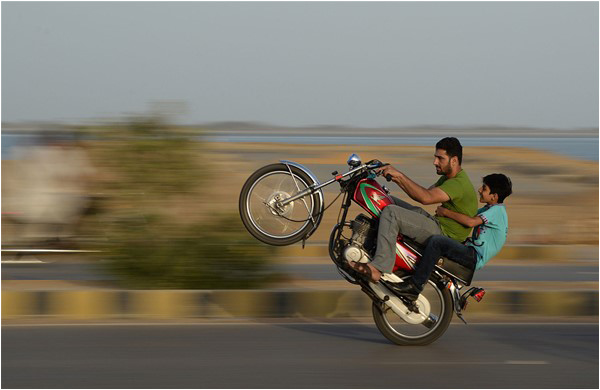
Besides the deaths, a large number of young men have suffered permanent disabilities. Two bikers died in different accidents many years ago. One was Sabih from Lahore, who died while performing stunts on his 125cc bike, and the other was a heavy biker from Lahore who died midnight while racing. The slogan of that heavy biker was, “Life begins at 240 km/hr”. Regarding Sabih, his parents showed immense courage after his death to allow a private channel to complete a documentary already being shot on his life, just to protect other young men. That documentary “Sabih Ruka Nahi” shows real life scenes and his funeral.
A few one-wheelers take to crime as well. Just a few months back, a traffic warden was shot and injured in Rawalpindi while attempting to stop them.
Jawad Akram,
Via email.
Smog and crops
Sir,
It is believed that prime reason for a smog blanket in the lower atmosphere in Lahore has been caused by crop burning in New Delhi and in Lahore. Farmers sow crops in November for the next season but set fire to their fields to remove the stubble of the previous crops.
According to the experts, crop burning is being misinterpreted and could not be said to be the main reason for smog. Man-made causes include deforestation, vehicular emissions, industrial emissions, brick kilns and coal burning. A major contributor to air pollutants are coal-based industrial plants. Similarly, the number of vehicles has dramatically increased in Lahore. There are many factories all around the city that do not use natural gas and burn other types of materials including rubber and tyres.
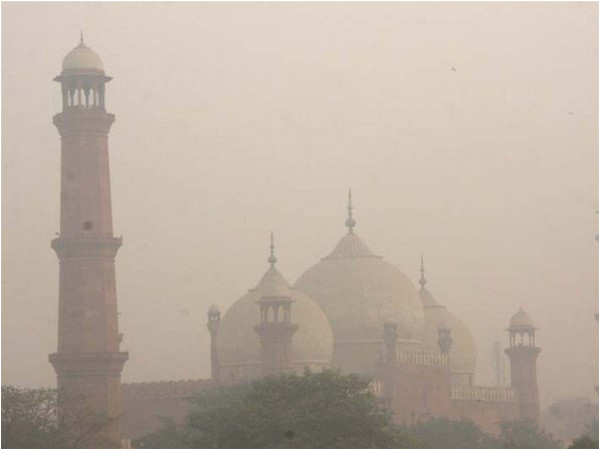
Chemist Arie-Haagen Smit, the father of air pollution control, identified two primary pollutants that cause smog: Volatile Organic Compounds (VOCS) and Nitrous Oxides. VOCS could easily be converted into vapours that may contain elements such as Carbon, Hydrogen, Chlorine and Sulphur. Incomplete combustion of Nitrous Oxides gives smog its yellow colour. The particles react with sunlight to form secondary air pollutants such as PANs and ground level ozone.
During the winter, the thick and dense fog layer in the lower atmosphere does not allow pollutants to escape, Photochemical smog is strongest in urban areas with calm winds and dry warm, sunny weather. Similarly, delayed rainfall intensified the situation for the city over the last few years.
EPA labs need to have empirical evidence to take action against offenders. Readings must be publicized through websites or social media. We must switch to alternative energy.
Smoke-producing transport such as two-stroke autos and old vehicles with obsolete engines should be banned.
Haider Ali,
Lahore.
Rigging in 2018
Sir,
Once again the same old complaint was heard in the NA-4 election in Khyber Pakhtunkhwa. It was the sound of an election being rigged. The same slogan was heard in the NA-120 by-election and even in the general elections of 2013.
It is expected it will be heard in the upcoming general elections of 2018. The financial as well as non-financial resources of the state’s organs, including the judiciary, will be wasted investigating the systematic rigging.
General elections are purely based on the feelings and aspirations of the people. In 2013, turnout was impressive. According to the Election Commission of Pakistan (ECP), the turnout was 55%, the highest since 1970.
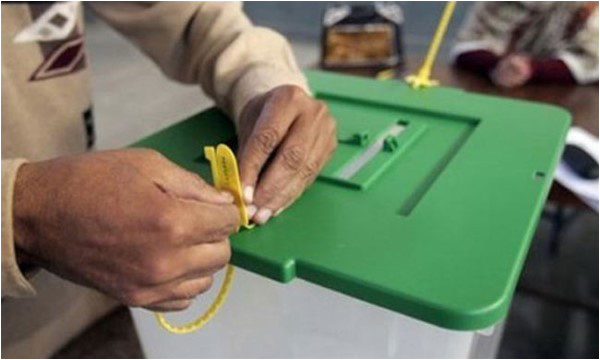
The driving force is considered to be the PTI. The PML-N swept the elections. The PTI did not live up to expectations. Imran Khan led a massive campaign that lasted 126 days against the government.
Why are elections in Pakistan rigged? Are we not heading towards democracy? These are the questions that arise when one listens to the claims of the losers.
These voices challenge the authenticity of the elections. The winners will brag about their victory while the losers will claim rigging. At least, the federal ruling parties should not have raised these concerns as they have been in power for decades and had many chances to get rid of loopholes in the system. But they are politicians; this might not be their first priority.
A major responsibility when conducting elections with transparency, falls on the shoulders of the Election Commission. It should be free of any political pressure.
The use of fake CNIC cards to cast votes, thumb non-verification, undue influence inside and outside polling stations by candidates, crossing the ECP expenditure limit of 1.5 million rupees etc. etc. are the real issues the ECP needs to take into consideration.
The absence of women voters is also an added challenge that is primarily linked to the security agencies if not with the ECP.
One of the components of strong elections is the genuineness of the results. The opposition accepts its defeat rather than challenges it in court and on the street. Will there be any time to come in Pakistan when all parties accept the results of a general or by-election?
Junaid Ali Malik,
Via email.
Annihilation of PIA
Sir,
PIA routes and profitability, once the pride of Pakistan, have been systematically subjected to annihilation by powerful vested interests who have immense political clout in corridors of power. Is it a mere coincidence that PIA flight from Lahore to Muscat has been discontinued and immediately a private airline belonging to a powerful figure started operating on this sector and none other than our Ambassador to Muscat who happens to be the son of a Zia-era retired khaki, appointed by this government, is actively involved in promoting this?
This has been happening ever since 1992, including the Musharraf tenure, with a nexus of corrupt PIA executives, the CAA and those who hold power, giving away traffic rights to Gulf-based airlines to the sole disadvantage of the national airline.
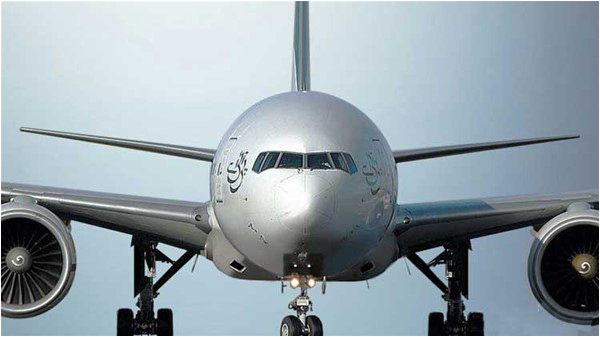
It is not just these Gulf-based airlines who are beneficiaries of this systematic destruction of PIA but also private airlines. While PIA revenues are being depleted it has to bear the burden of giving jobs to cronies of successive governments and cater to the affluent lifestyle of a corrupt ruling elite, such as making a B777 available to a former PM on his three-day tour to the Maldives although PIA had a shortage of serviceable aircraft. What else could be expected other than losses on flights to New York when instead of a marketing officer a manager of passports is posted as Country Manager?
PIA losses have risen exponentially ever since 2005, and from 2008 onwards they have spiralled out of control, driving it to a state of technical insolvency. How could daylight robberies like the start of a Premier Service be initiated or leasing aircraft at almost 60% over and above a prevailing market rate go on unchecked without patronization? The naked display of conflicts of interest such as an award of the catering contact for all European flights to a company owned by the family of an MD or the signing of a procurement deal with TransWorld Aviation are a few examples.
Why not close PIA instead of bleeding it to death?
Gull Zaman,
Peshawar.
Saudi purge
Sir,
It was very unexpected to see the elite mega anti-corruption drive take place in Saudi Arabia by the state authorities. To remain brief, I will say that this could not have happened after a quick decision and there must have been an intensive and long period of planning and thinking behind this drive to eradicate corruption from Saudi Arabia.
I apprehend that there are likely and favorable chances of the US and Iran having played a key role in the motivation process due to political and personal/self-interests.
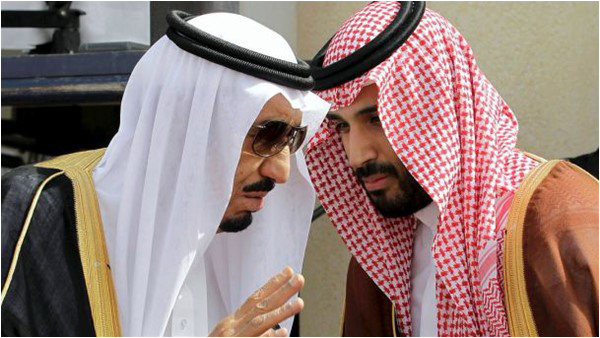
The US has a lead over other influential countries in motivating countries and we have seen exceptional work in this regard in reference to Weapons of Mass Destruction (WMD). I personally favor all motivations of national or international levels if sincerely done for the purpose of achieving practical and meaningful benefit for the public or humanity at a larger scale. Generally, this is not the case though and people feel their leaders are motivated by self-interest more often than not.
The only good thing in the drive to eradicate corruption in Saudi Arabia has been the arrests and suspensions from top to bottom and not from bottom to top. It will be good for Saudi Arabia if the authorities assure justice is done and all apprehensions will be overruled if corruption is eradicated with proven results in the coming months.
Advocate Khalid Mustafa,
Islamabad.

